
-
On November 16th, 2023, the Student Renaming Committee presented at Town Meeting and Town Meeting members voted overwhelmingly to approve our Warrant Article, renaming our school to the Roland Hayes School!
We thank everyone who supported this process – the members of our school community, Town Meeting members, scholar Dr. Barbara Brown, and the many expert guides who helped along the way.
Here are links to two videos and a podcast that will help you to relive the moment:
- YouTube Micro-Documentary: https://youtu.be/xAPjcedVkFY?si=Th5e2XXVbwB41XMl
- Brookline Town Meeting presentation and vote (starting at 14 minutes): https://www.youtube.com/live/Po5rMjpIYFw?si=JHK8Ba0O57TepNfW
- A segment of the Boston Public Radio podcast all about Roland Hayes, in which we ghet a brief mention: https://podcasts.apple.com/us/podcast/boston-public-radio-podcast/id923045032?i=1000635218107
Here, also, is our slide deck presentation from Town Meeting:
https://docs.google.com/presentation/d/10WpjqMk3pnaFh4UOW9StViepa6pAnMl-06CphrBuWWQ/edit?usp=sharing
And, a message from Roland Hayes's family:
I am so happy to hear this !! I know my girls will be equally happy.
Many thanks to you and the committee for making this possible.
May the students really understand how significant this is and how proud they should be of their participation in the process of changing the name of the school.
Sincerely,
Afrika Hayes Lambe
Zaida Christine Lambe
Erika Rolande Lambe
-------
June 9, 2023
Roland Hayes was selected as our new school name!
Roland Hayes was born in 1887 to farmers in Curryville, GA. He first learned how to sing by attending church as a child. Hayes' voice impressed many people. With only five years of schooling, he was admitted to Fisk University where he joined the famous Fisk Jubilee Singers.
Hayes believed in himself and his ability. When the Fisk singers performed in Boston, Hayes chose to remain here for further voice training, becoming renowned for his vocal talents. At the beginning some orchestras and concert halls would not let him perform, because he was Black. By the 1920’s, he had become one of the best classical tenors in the world. In his sold-out concerts, he sang different kinds of music; audiences were amazed when he sang songs from Italy, Germany, and France. Hayes was proud of being Black, so he always included African-American folk songs and spirituals in his programs.
Hayes believed that music was crucial to understanding and expressing yourself. During his tours, he would also try to find time to visit local schools and meet with musical students. Hayes encouraged them to incorporate their cultures and histories into their singing. He performed his last concert at 85 in Cambridge, MA.
He and his family lived in Brookline for many years.
Did You Know? Hayes was the first African-American soloist to appear with the Boston Symphony Orchestra in 1923.
Quote: "The beauty of what could be done with the voice just overwhelmed me.” - Roland Hayes
--------
Some Statistics
How many people voted?
In total, 733 people cast a vote for our new school name. That is extraordinary!
How did the percentages break down of who participated?
- 57.4% (421 people) of voters were students
- 29.3% (215 people) of voters are family members
- 13.2% (97 people) of voters are current staff
On June 15th, I will present the results of this vote to the School Committee for their consideration. There are a few steps left to take, including this important vote from School Committee members and a vote at Town Meeting this fall. But, in my humble opinion, the work we have done up to this point is transformative and extraordinary.
- The School Committee meeting is THURSDAY, JUNE 15, 2023, 6:00 PM – 10:05 PM and is live streamed at https://www.youtube.com/channel/UCtl_u3j2UDQMXK-G6QD5g_w
______________________
VOTING!
In June we will hold TWO votes using ranked choice voting:
- The first will be a PRACTICE vote, to make sure our voting system is working. We will be voting on our favorite type of ice cream flavor. The practice vote will happen June 1 and 2.
- The second vote will be to decide our new school name! The school name vote will take place June 8 and 9.
Who can vote? Current students, current staff, and current families. Students will vote at school during the school day. We sincerely hope that you will have these conversations at home and talk about the merits of each candidate before casting your votes!
---------------
BIG Announcement! Our Four Finalists!
After careful deliberation, significant time doing research, and lots of introspection, the Student School Naming Committee is excited to announce our four finalists for our new school name! The finalists are (in alphabetical order):
- Ruth Batson
- Ellen & William Craft
- Roland Hayes
- John Woodrow Wilson
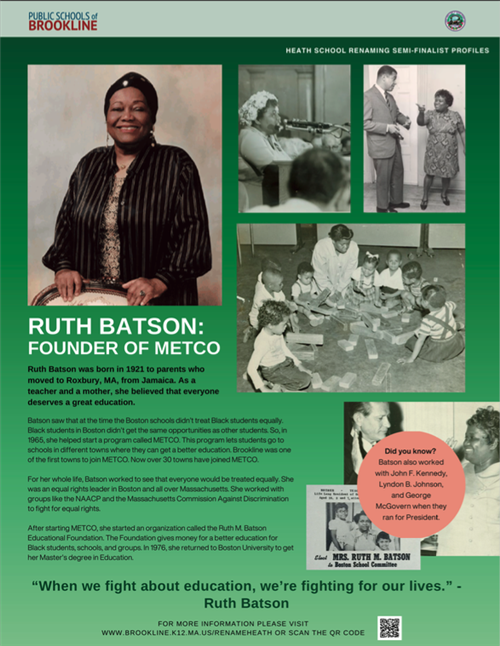
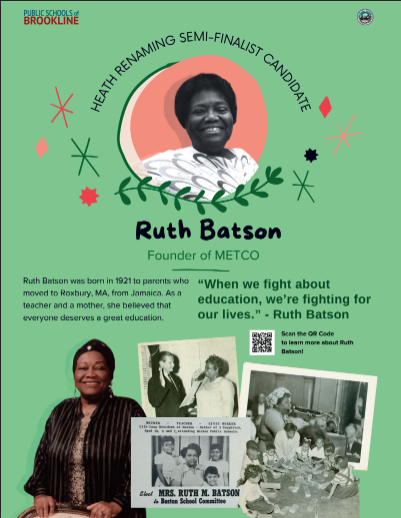
Ruth Batson: Founder of METCO
Ruth Batson was born in 1921 to parents who moved to Roxbury, MA, from Jamaica. As a teacher and a mother, she believed that everyone deserves a great education.
Batson saw that at the time the Boston schools didn’t treat Black students equally. Black students in Boston didn't get the same opportunities as other students. So, in 1965, she helped start a program called METCO. This program lets students go to schools in different towns where they can get a better education. Brookline was one of the first towns to join METCO. Now over 30 towns have joined METCO.
For her whole life, Batson worked to see that everyone would be treated equally. She was an equal rights leader in Boston and all over Massachusetts. She worked with groups like the NAACP and the Massachusetts Commission Against Discrimination to fight for equal rights.
After starting METCO, she started an organization called the Ruth M. Batson Educational Foundation. The Foundation gives money for a better education for Black students, schools, and groups. In 1976, she returned to Boston University to get her Master's degree in Education.
Did You Know? Batson also worked with John F. Kennedy, Lyndon B. Johnson, and George McGovern when they ran for President.
Quote: “When we fight about education, we’re fighting for our lives.” - Ruth Batson
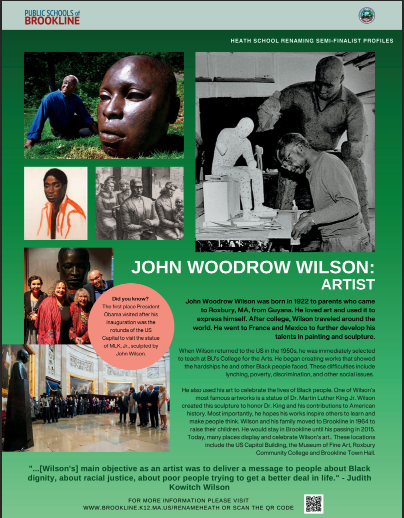
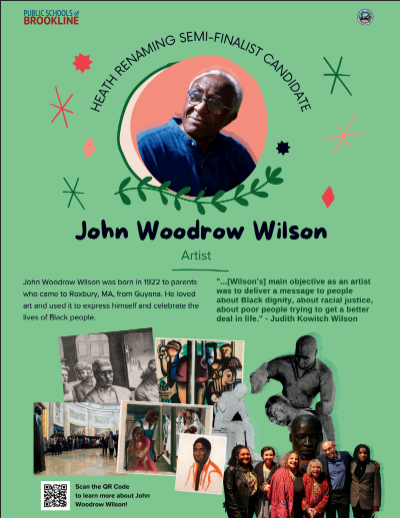
John Woodrow Wilson: Artist
John Woodrow Wilson was born in 1922 to parents who came to Roxbury, MA, from Guyana. He loved art and used it to express himself. After college, Wilson traveled around the world. He went to France and Mexico to further develop his talents in painting and sculpture.
When Wilson returned to the US in the 1950s, he was immediately selected to teach at BU’s College for the Arts. He began creating works that showed the hardships he and other Black people faced. These difficulties include lynching, poverty, discrimination, and other social issues.
He also used his art to celebrate the lives of Black people. One of Wilson's most famous artworks is a statue of Dr. Martin Luther King Jr. Wilson created this sculpture to honor Dr. King and his contributions to American history. Most importantly, he hopes his works inspire others to learn and make people think. Wilson and his family moved to Brookline in 1964 to raise their children. He would stay in Brookline until his passing in 2015. Today, many places display and celebrate Wilson's art.. These locations include the US Capitol Building, the Museum of Fine Art, Roxbury Community College and Brookline Town Hall.
Did You Know? The first place President Obama visited after his inauguration was the rotunda of the US Capital to visit the statue of MLK, Jr., sculpted by John Wilson.
Quote: "...[Wilson's] main objective as an artist was to deliver a message to people about Black dignity, about racial justice, about poor people trying to get a better deal in life." - Judith Kowitch Wilson
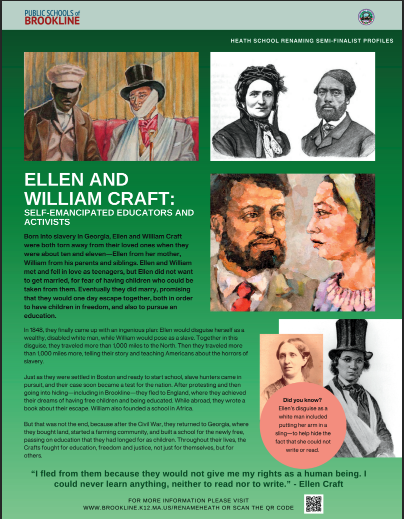
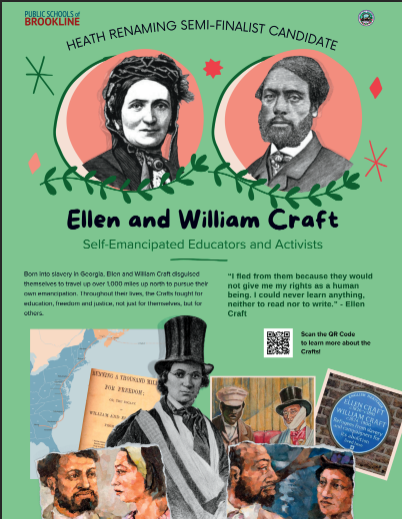
Ellen and William Craft: Self-Emancipated Educators, Activists
Born into slavery in Georgia, Ellen and William Craft were both torn away from their loved ones when they were about ten and eleven—Ellen from her mother, William from his parents and siblings. Ellen and William met and fell in love as teenagers, but Ellen did not want to get married, for fear of having children who could be taken from them. Eventually they did marry, promising that they would one day escape together, both in order to have children in freedom, and also to pursue an education.
In 1848, they finally came up with an ingenious plan: Ellen would disguise herself as a wealthy, disabled white man, while William would pose as a slave. Together in this disguise, they traveled more than 1,000 miles to the North. Then they traveled more than 1,000 miles more, telling their story and teaching Americans about the horrors of slavery.
Just as they were settled in Boston and ready to start school, slave hunters came in pursuit, and their case soon became a test for the nation. After protesting and then going into hiding—including in Brookline—they fled to England, where they achieved their dreams of having free children and being educated. While abroad, they wrote a book about their escape. William also founded a school in Africa.
But that was not the end, because after the Civil War, they returned to Georgia, where they bought land, started a farming community, and built a school for the newly free, passing on education that they had longed for as children. Throughout their lives, the Crafts fought for education, freedom and justice, not just for themselves, but for others.
Did You Know? Ellen’s disguise as a white man included putting her arm in a sling—to help hide the fact that she could not write or read.
Quote: “I fled from them because they would not give me my rights as a human being. I could never learn anything, neither to read nor to write.” Ellen Craft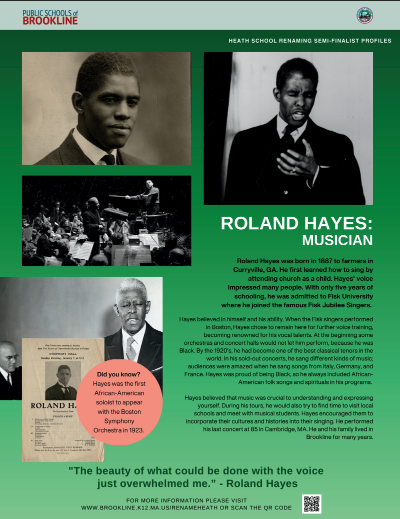
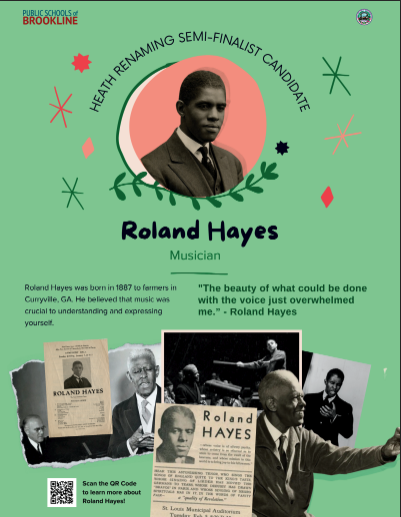
Roland Hayes: Musician
Roland Hayes was born in 1887 to farmers in Curryville, GA. He first learned how to sing by attending church as a child. Hayes' voice impressed many people. With only five years of schooling, he was admitted to Fisk University where he joined the famous Fisk Jubilee Singers.
Hayes believed in himself and his ability. When the Fisk singers performed in Boston, Hayes chose to remain here for further voice training, becoming renowned for his vocal talents. At the beginning some orchestras and concert halls would not let him perform, because he was Black. By the 1920’s, he had become one of the best classical tenors in the world. In his sold-out concerts, he sang different kinds of music; audiences were amazed when he sang songs from Italy, Germany, and France. Hayes was proud of being Black, so he always included African-American folk songs and spirituals in his programs.
Hayes believed that music was crucial to understanding and expressing yourself. During his tours, he would also try to find time to visit local schools and meet with musical students. Hayes encouraged them to incorporate their cultures and histories into their singing. He performed his last concert at 85 in Cambridge, MA.
He and his family lived in Brookline for many years.
Did You Know? Hayes was the first African-American soloist to appear with the Boston Symphony Orchestra in 1923.
Quote: "The beauty of what could be done with the voice just overwhelmed me.” - Roland Hayes
________________________________
Learning from Experts
The videos below capture four important we have had here with folks who are expert in the lives of our finalists. We hope you'll take the time to watch and learn!
- Erica and Roy Wilson teach us about their dad, Artist John Wilson: https://youtu.be/DYYuTlI3gJA
- Milly Arbaje-Thomas, President & CEO of METCO, Inc., shares the good news of Ruth Batson, the Founder of METCO: https://youtu.be/SJm6wHPCVds
- Author Ilyon Woo discusses Ellen & William Craft: https://youtu.be/wbXwvq2xg7Q
- Hidden Brookline's Dr. Barbara Brown teaches us about Roland Hayes:
- https://youtu.be/4CqDzxzHRGE
We are so thankful for these partners who graciously shared their time and expertise with us!
________________________________
Here are resources for each candidate (again, alphabetically):
Ruth Batson
Ellen & William Craft
-
The Great Escape From Slavery of Ellen and William Craft | History| Smithsonian Magazine
-
"A Desperate Leap for Liberty": The Escape of William and Ellen Craft
-
The Daring Disguise that Helped One Enslaved Couple Escape to Freedom - HISTORY
-
"Master Slave Husband Wife": A startling tale of disguise to escape slavery - CBS News
Roland Hayes
-
Roland Hayes Biography – Afrocentric Voices in "Classical" Music
-
Trailblazing Singer Roland Hayes Turned Struggles into Triumphs | WQXR Editorial
-
https://www.pbs.org/video/wpt-archives-1990s-musical-legacy-roland-hayes/
John Wilson
-
Sculpting a Legacy: The Art and Impact of John Wilson | Tufts Now
-
Acquisition: John Wilson’s "Young Americans" Suite and Five Additional Works on Paper
-
John Wilson, at 92; artist spurred by social realities - The Boston Globe
-
Oral history interview with John Wilson, 1993 March 11-1994 August 16
We are very excited by this news and hope you are, too!
________________________________
Heath School Name Committee – Mission Statement: https://docs.google.com/document/d/1JuPSxey6XkzUkC6vgylUo2j_GL7SSz2c2BdWy_e8Efo/edit?usp=sharing
________________________________
We invite you into a conversation about identity and recognition, the history of slavery in our community, deepening our commitment to school safety, and complex change.
Our school holds a prominent place in our community. The school building is nestled squarely in a quiet neighborhood, creating a safe harbor for all students, whether from right down the block or coming each day from Boston. Generations of children have established their educational foundations here, while their families have turned to this space with great trust, boundless hope, and expectations for excellence. Countless teachers have made this place their professional home, dedicating part or all of their careers to the work inside these walls.
This school has played a central role in so many lives for over 100 years.
In the very recent past, we learned that our school had indeed been named after a street, but that the street had been named after a family: the Heath family. The Heath family took tremendous pride in the school on their street. They also, according to Town records, enslaved three people.
Knowing that our beloved school is named for a family that enslaved other humans has made it increasingly difficult to promote our vision for inclusion and equity.
This virtual space is intended to serve as a source of information, updates, and resources so that we can collectively understand the role of slavery in our community, the impact on our school, create a vision of ourselves more aligned with our current values, and build as safe a community as possible for those in our care.
Reckoning with this past is essential to building a better future for our students.
___________________________________
Choosing a New School Name
Naming a school is important. A school name should represent the spirit, virtues, and soul of its community. As community members, we have a unique responsibility and an incredible opportunity to choose a name that we can honor and celebrate.
The new name we choose should:
-
Uplift a person, place, or event that exemplifies those core beliefs and reflects our community’s past, present, and future (see Town Bylaws)
-
Reaffirm our commitment to fostering an equity-focused, aspirational, inclusive, and mindful community
-
Demonstrate our commitment to Brookline as a great place to learn and grow
-
Be an exemplar for students in our care now and for those students to come
-
Recognize the contributions of all people to the town’s rich history
(Announced December 9, 2022) Here, at last, is the "List of Nominees for New School Names;" I also shared this list at Tuesday's PTO meeting. These nominees have not been vetted yet; this is simply a list of all the nominees we received in our open process. We had 29 submissions, with 23 unique nominees.
In no particular order, here are the nominees:
Roland Hayes
Bernard Pendleton (former art teacher)
Ellen & William Craft
Heddy Lamarr
Michael Dukakis
Francis Ouimet
Edward Kirrane
Massasoit
Eunice Kennedy Shriver
Bill Russell
Manuel Del Valle Jr
Ruth Bader Ginsburg
Frederick Law Olmsted
Ruth Batson
Sybil Holmes
John Wilson
The Settlement
Montowampate (aka Sagamore James)
Harmony
Kindness
Judith Heumann
Charles Sprague Sargent
Quabbin Reservoir
Harriet Tubman
Here you will find a data spreadsheet where lots of information about candidates has been gathered: https://docs.google.com/spreadsheets/d/1So1gLBh85cDVbXDGooMvMP6LEMWJ1W1UZXM1aL9oaAQ/edit?usp=sharing
January 20, 2023
Update on School Renaming Efforts
Our student committee, with students in grades 4 - 10 in attendance, has been working carefully in so many ways to determine a path forward for us in the school renaming process. One of their first orders of business was to consider a more specific criteria for selecting a candidate. The student committee members, along with adult guides, believe the following criteria will serve us well and we begin to narrow the field of finalists:
Required, by Town Bylaws
- Person, Place, or Event
Required, as recommended by Student Committee in partnership with adult committee members:
- Connection to Greater Boston and Brookline
- A helper. Someone who contributed to the community and made a positive impact
- A connection to education and/or commitment to educating others
- *** Not an Indigenous Name. As our school has no historical or current connection to Indigenous Peoples, other than sitting on Native land, we do not want to appropriate Indigenous names or culture for our own gains
Nice to Have, as recommended by Student Committee in partnership with adult committee members:
- Represented elsewhere? We strive to recognize those who are underrepresented in our community
- Is the candidate a Person of Color? We strive to recognize those who are historically underrepresented in our community
- Is the person still living? Has the person passed? The preference is someone who has passed as we can examine their entire life, contributions, and impact
*** More Perspective on Indigenous Nominees
In the spirit of reflection and reconciliation, the BHS student newspaper, The Sagamore, has begun the process of changing its name. I found this article in their archives that really was illuminating, too: link. Knowing this, recognizing that the student committee does not feel it is appropriate, and in consultation with Indigenous groups an Indigenous name will not forward as a finalist for our school. Thus, Sagamore James, Massasoit, and the Quabbin Reservoir will not be in consideration moving forward.
Here, again, is the resources page on our website that lists all of the candidates: link. A great family activity might be to look at the criteria above and start to see who on our complete nominees list meet the criteria and who does not.
One of our candidates, Ellen & William Craft, have been in the news lately. Check out the CBS Sunday Morning piece on them:
Of note: early in our process, Mr. Bernie Pendleton, the art teacher here for 30 years, was listed as a nominee. Mr. Pendleton was appreciative of the consideration, but humbly declined the honor. We remain grateful for his service to our community!
________________________________
Many of you might have questions or comments about the Heath School name, the history of the name, and the renaming process. We hope that after you explore the resources here, and that if you have additional questions or want to share a comment you’ll then submit those questions and comments here: https://forms.gle/fE6Ezs2MHdsDcd199. We will then work to provide information on the next steps in the process and clarity on the lingering questions in the community.
Resources:
Announcement: Heath Renaming Process, October 18, 2022: https://docs.google.com/document/d/1hRYm9JiYdGxQB2UAluHJwwcNRrOxW_xQ5i1_5-PBxL8/edit?usp=sharing
Letter to the Community, December 13, 2021: https://docs.google.com/document/d/1taybMj47qgIK-rjFjNl-1ES0aHpueS04YlRHwD8yIHM/edit?usp=sharing
Brookline History: Schools, Brookline History Schools.pdf
Florence Palmer Peabody’s “When I Went to School” (from the Dedication of the New Heath School, 1959):
http://brooklinehistoricalsociety. org/history/proceedings/1960. pdf Florida Ruffin Ridley Renaming Process: Coolidge Corner Naming Process
Harmony Grove (Framingham Public Schools) Renaming Process, About Us / Renaming Our School
Hidden Brookline’s Website, HIDDEN BROOKLINE
Hidden Brookline, The Heath Family: Slavery and Inherited Wealth: https://hiddenbrookline.weebly.com/heath-the-school--the-family.html
From “The Slave Holding History of Brookline and Implications for the Heath School,”3.19.19 Ad Hoc Task Force Agenda and Materials.pdf
School Naming Committees: Meeting Notes and Agendas, SY23: https://docs.google.com/document/d/11byTg8xuHg0aUptdSDt1Y8BHsKcZAlKdVDKl9jJHWK8/edit?usp=sharing
School naming Committee: Zoom Sessions: https://drive.google.com/drive/folders/12o38OgAHBeExObFSHBNFqrkB4vEMmKCU?usp=sharing
Heath School Name: Dinner Conversation Starters & More! https://docs.google.com/document/d/1qNBB1Sm6adNvJgthciEyFpBLX_Rd_a7Q2ZojgpYPqeA/edit?usp=sharing
Memo: Survey Results: https://docs.google.com/document/d/1JXsUw5d-j80QDajyx-MERtpL6rLKPxolr7Q9lj69Y_I/edit?usp=sharing
Recordings of the three Community Conversations we have remain up and on YouTube for your viewing. Find them here:
-
From March 16, 2022 – Hidden Brookline
-
From March 29, 2022 – The Heath School Name Dialogue
-
From April 5, 2022 – Florida Ruffin Ridley School Renaming Process
Student Work & Learning
Student Learning Opportunities – https://docs.google.com/document/d/1kLyNHznibtjfJD3ZiIDmohdmZ14SpYO1hlXVNkcb-vo/edit?usp=sharing
8th Grade Student Presentations, Spring 2022: https://docs.google.com/document/d/1e61Q6h5lx_A3NdYoaGxSppiH2Z9hePEn8neNI3esreE/edit?usp=sharing
4th Grade, Letters to Town Meeting Members, Spring 2022: https://docs.google.com/document/d/1HAuCaxqNOxYoEdhaSBUsLC7UN2wnfwySGGqfaXWyV1s/edit?usp=sharing


